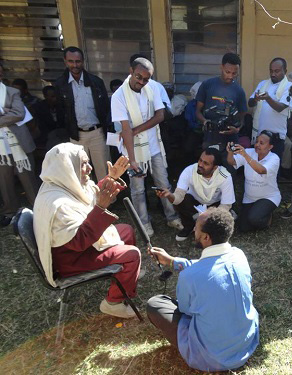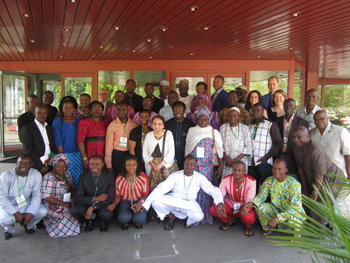HFG: Accelerating Country Progress towards UHC
Categories: Announcements, Universal Health Coverage
USAID’s HFG Project is working with partners around the world to protect families from catastrophic health care costs, expand access to priority services – such as maternal and child health care and HIV services, and ensure equitable population coverage. These three pillars are at the crux of the global movement for Universal Health Coverage, which means universal access to quality health care without financial hardship.
HFG collaborates closely with country counterparts to accelerate their progress towards UHC, by addressing three high-level questions:
- How should limited health resources be allocated to achieve UHC? Using tools such as the OneHealth Tool and National Health Accounts, HFG supports countries to maximize health impacts as they decide where and how to spend scarce health resources.
- Which health policies should be implemented to promote UHC? Policy choices made in the early phases of UHC strategy development can have long-lasting effects on the success and pace of country leaders’ efforts to expand population coverage. HFG supports countries to strategize on how to generate revenue for the health sector, how to pool resources and ensure financial protection, and how to purchase quality health services efficiently for the population.
- How should a country’s progress towards UHC be measured? Information on whether a country is reaching the poor, protecting families from financial hardship, and ensuring effective access to key services is critical to meeting UHC objectives. HFG helps countries capture and use information on progress towards UHC from a variety of data sources.
As both a country partner and a global thought leader, the HFG Project is on the frontlines of promoting UHC worldwide. Read more about HFG’s UHC work in the following highlights.
Ethiopia Scales Up Community-based Health Insurance Ethiopia has a long-standing tradition called idir or kire, in which community organizations provide financial help to families for emergencies, like funerals. Now, a new form of the tradition, called “idir (or kire) while alive” is gaining popularity as the Ethiopian government pursues its goal of providing UHC through community-based health insurance (CBHI). CBHI is health insurance that pools members’ premium payments in a fund that is managed by the members. The fund covers the cost of basic inpatient and outpatient health care services, primarily at local health centers but even at hospitals when a member is referred by the lower-level health facilities. Previously, patients would have had to pay out of pocket for these services. Read the full story.

Expanding coverage and promoting sustainability in Ghana HFG is a key technical partner in Ghana’s efforts to achieve UHC. HFG has partnered with the National Health Insurance Agency (NHIA) in Ghana to support the financial sustainability of the country’s national health insurance scheme, while also increasing enrollment and improving effective coverage of quality health services.
Pathways to UHC: The Role of Evidence in Shaping Benefits Packages Countries moving toward UHC have pursued alternative pathways and realized different results. As countries work to expand coverage, they have asked for guidance on how to do so effectively and efficiently. HFG is collaborating with the Joint Learning Network for UHC to document the role of evidence in developing UHC benefits packages. Defined benefits packages can help ensure the availability of priority services, especially those that are cost-effective and those most likely to be used by poor and vulnerable populations.
By capturing experiences from countries at different stages of economic development, the team is answering important questions: When has evidence influenced the inclusion or exclusion of covered benefits in a service package? When are explicit criteria, such as cost-effectiveness or financial protection, most likely to be used to influence benefit package design? The final product will provide actionable, useful lessons for countries designing or revising their benefit packages.
Measuring and Monitoring Countries’ Progress towards Universal Health Coverage Many countries have declared their commitment to achieve UHC and introduced policies and approaches to achieve that goal. However, there are few guidelines for measuring and monitoring countries’ progress towards UHC. The HFG project conducted case studies in Ethiopia, Cote d’Ivoire, and Senegal and found that these countries are able to measure several but not all of the World Health Organization’s suggested UHC indicators. The countries are especially interested in monitoring implementation of their reforms aimed at reaching the poor and build capacity to collect relevant data. The Ethiopia case was recently featured in the journal PLOS Medicine’s Monitoring Universal Health Coverage Collection.
 Nigeria Workshop: Scaling up Universal Health Coverage Recently, the Nigerian Federal Ministry of Health, USAID, and the HFG Project are delivering a Healthcare Financing Capacity-Building Workshop for health officials from around Nigeria. The impetus was a Presidential Summit held in Abuja in March 2014 that issued a ‘Declaration on Universal Health Coverage in Nigeria.’ The declaration recognized that Universal Health Coverage (UHC) “… holds the key to unlocking the door for equitable, qualitative and universally accessible healthcare for all Nigerians without suffering financial hardship.” Learn more.
Nigeria Workshop: Scaling up Universal Health Coverage Recently, the Nigerian Federal Ministry of Health, USAID, and the HFG Project are delivering a Healthcare Financing Capacity-Building Workshop for health officials from around Nigeria. The impetus was a Presidential Summit held in Abuja in March 2014 that issued a ‘Declaration on Universal Health Coverage in Nigeria.’ The declaration recognized that Universal Health Coverage (UHC) “… holds the key to unlocking the door for equitable, qualitative and universally accessible healthcare for all Nigerians without suffering financial hardship.” Learn more.
UHC Roll-out in Benin HFG is collaborating with the Government of Benin on its initiative to develop and roll out UHC countrywide as a means of ending preventable child and maternal deaths. HFG works in three regions to help expand CBHI or mutuelle networks. Mutuelles are a key element of the government of Benin’s strategy to achieve UHC and improve the health of the poor. HFG is also helping coordinate the enrollment of informal sector workers and rural populations in their respective catchment areas.
Asia Regional Flagship Course on Health Systems Strengthening and UHC At least half a dozen Asian countries are planning or implementing governance and financing reforms to achieve universal health coverage. But policymakers in these countries are faced with difficult decisions, including how to fund health care, which health services to cover, and which populations to cover first.
To assist their planning process, USAID sponsored five-day Asia Regional Flagship Course on Health Systems Strengthening and Sustainable Financing: The Challenge of Universal Health Coverage in Bangkok, Thailand in 2014. HFG supported the course at which experts from around the world taught sessions ranging from health coverage regulation and financing to improved hospital governance and organizational change.
The course was attended by 63 participants from 11 target countries: Cambodia, India, Indonesia, Laos, Myanmar, Nepal, Papua New Guinea, Philippines, Thailand, Timor-Leste, and Vietnam. Participants included officials from Ministries of Health, Finance, and Planning as well as donor representatives.
Harvard University professor emeritus Marc Roberts presented a new refinement of the World Health Organization’s “UHC cube” to emphasize the importance of prioritization on the road to UHC, such as having an initial focus on the poor, the breadth of coverage, and boosting financial protection. Learn more.



